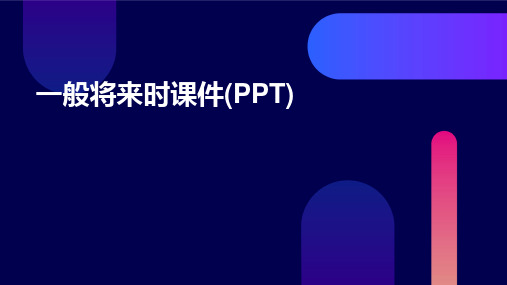一般将来时讲解和练习PPT课件
合集下载
一般将来时(21张PPT)初中英语专项复习课件(2)

I hope it will be warm tomorrow. (主观意愿) 我希望明天会暖和起来。
【典例1】My sister wants a new dress. She ____ it
to the party.
A. wears
B. is going to wear
C. wore
D. has worn
考查动词的时态。句意:我妹妹想要一条新裙子。她想 派对上穿。由My sister wants a new dress可知动作还未执 行,故用be going to形式,表示有计划做某事。
【典例2】He ________ her a beautiful hat on her next
birthday.
【典例3】 —Which team do you think ______ the game? —Hard to say. There are still ten minutes before it ends. A. won B. has won C. will win D. wins
考查动词的时态。句意:—你认为哪个队会赢这场 比赛?—不好说。还有十分钟才结束。根据句意判 断为一般将来时,选用will+动词原形。
volleyball match.
A. will watching B. watches
C. is watching
D. are going to watch
考查动词的时态。句意:后天,他们将看一场排球 赛。The day after tomorrow为一般将来时标志词, 选用将来时结构be going to do,故答案选D。
【典例2】There __________ a meeting tomorrow
【典例1】My sister wants a new dress. She ____ it
to the party.
A. wears
B. is going to wear
C. wore
D. has worn
考查动词的时态。句意:我妹妹想要一条新裙子。她想 派对上穿。由My sister wants a new dress可知动作还未执 行,故用be going to形式,表示有计划做某事。
【典例2】He ________ her a beautiful hat on her next
birthday.
【典例3】 —Which team do you think ______ the game? —Hard to say. There are still ten minutes before it ends. A. won B. has won C. will win D. wins
考查动词的时态。句意:—你认为哪个队会赢这场 比赛?—不好说。还有十分钟才结束。根据句意判 断为一般将来时,选用will+动词原形。
volleyball match.
A. will watching B. watches
C. is watching
D. are going to watch
考查动词的时态。句意:后天,他们将看一场排球 赛。The day after tomorrow为一般将来时标志词, 选用将来时结构be going to do,故答案选D。
【典例2】There __________ a meeting tomorrow
一般将来时课件(PPT)

“be able to”表示将来有能力做某 事时,使用一般将来时形式,例如“I will be able to help you”。
情态动词如“can”、“may”、 “must”等,在一般将来时中通常直 接加动词原形,例如“I can swim”。
03
一般将来时在句子中的运用
陈述句中的使用
表示将要发生的动作或存在的状态
纠正方法
应使用正确的将来时形式,如 "He will go to the park tomorrow." 或 "He is going to the park tomorrow."
忽略动词变化规则
错误示例
They will play football in the future.(忽略了动词play在将来时中的变化)
纠正方法
在将来时中,应使用正确的助动词或情态动词形式,如 "I will be able to help you with your homework." 或 "I can help you with your homework."
错误示例
He will must finish his work before leaving.(错误地使 用了情态动词must)
作用
用于表示未来的计划、打算、预测、 假设等。
常见表达形式
will + 动词原形
表示将来的动作或状态,如“I will go to the park tomorrow.”(我明天将去公园。)
be going to + 动词原形
表示计划、打算或即将发生的动作,如“I am going to study hard this semester.”(我这 学期打算努力学习。)
一般将来时态讲解(共25张PPT)

• I wonder what will happen. • 我不知道将会发生什么事。
• I don't think the test will be very difficult. 。
②用于“祈使句 + and + 陈述句” 中
I don’t think it will rain this afternoon.
I am hungry. I think I’ll have something to eat.
表示看法,观点
“There be”句型的一般将来时 肯定句: There will be +名词+其他成份 [注意]:无论后面加单数名词或复数形式,be都必须用原形。
shall适用于第一人称I,We;而will适用于所有人称。 通常可以用will来代替shall。 will,shall均可缩写为:'ll,如:
I will= I'll; she will = she’ll;will not 和shall not分别可以 缩写为 won't 和shan't。
1.一般将来时的用法
4. be about to + 动词原形。 表示 (1)“即将做”或“马上做”
(2)因此,句子不能再用时间状语。
Don’t leave. Li Lei is about to come. 不要走了,李蕾就要来了。 Be quiet. The concert is about to start. 安静下来,音乐演唱会就要开始了。
• My uncle will come to see me every Saturday.
• 我叔叔每个星期六都会来看我。
• The students will have five English classes per week this term.
• I don't think the test will be very difficult. 。
②用于“祈使句 + and + 陈述句” 中
I don’t think it will rain this afternoon.
I am hungry. I think I’ll have something to eat.
表示看法,观点
“There be”句型的一般将来时 肯定句: There will be +名词+其他成份 [注意]:无论后面加单数名词或复数形式,be都必须用原形。
shall适用于第一人称I,We;而will适用于所有人称。 通常可以用will来代替shall。 will,shall均可缩写为:'ll,如:
I will= I'll; she will = she’ll;will not 和shall not分别可以 缩写为 won't 和shan't。
1.一般将来时的用法
4. be about to + 动词原形。 表示 (1)“即将做”或“马上做”
(2)因此,句子不能再用时间状语。
Don’t leave. Li Lei is about to come. 不要走了,李蕾就要来了。 Be quiet. The concert is about to start. 安静下来,音乐演唱会就要开始了。
• My uncle will come to see me every Saturday.
• 我叔叔每个星期六都会来看我。
• The students will have five English classes per week this term.
一般将来时PPT课件

05
解析
含有will的句子改为否定句时 ,在will后加not,缩写为 won't。
06
THANKS
感谢观看
06
一般将来时练习题精选与解析
选择题精选与解析
01
题目:I _______ to the cinema. Will you go with me?
02
A. go B. am going C. have gone D. went
选择题精选与解析
答案:B
解析:由后一句“Will you go with me?”可知是打算去做某事,是一般将来时,所以用现 在进行时表将来,选B。
题目:— What _______ you _______ to do tomorrow?
选择题精选与解析
— I _______ visit my uncle. A. are; going; am going B. are; going; am going to
C. are; going to; am going D. are; going to; am going to
区别
现在进行时强调当前正在进行的动作 或状态,而一般将来时则强调未来将 要发生的动作或状态。
联系
两者都可用于表示将来的情况,但侧 重点不同。现在进行时通过现在正在 进行的动作暗示将来,而一般将来时 则直接表达将来的动作或状态。
与过去将来时的区别与联系
区别
过去将来时表示从过去某一时间 看将要发生的动作或状态,而一 般将来时则是从现在看将来要发 生的动作或状态。
表示将来经常发生的动作或习惯
常用的时间状语
always, often, usually等 。
句子结构
一般将来时课件PPT(详细+练习)

Students are going to use computers to learn in the future.
• I will not tell it to him tomorrow.
I am not going to tell it to him tomorrow.
• She will go to school by car next week.
5、Are they going to make a snowman this holiday?
5、
No, they are going to fly kites this holiday.
The end
Thank you!
注意:won’t=will not
变特殊疑问句
They will have an English party next week.
①
②
③
① Who will have an English party next week ? ② What will they have next week ? ③ When will they have an English party?
What is The Simple Future Tense?
Past过去
①Will ②Be going to
Future未来
V.动词原形
Now 现在
• I will call you this evening. • I am going to call you this evening. • Students will use computers to learn in the future.
the future.
• I will not tell it to him tomorrow.
I am not going to tell it to him tomorrow.
• She will go to school by car next week.
5、Are they going to make a snowman this holiday?
5、
No, they are going to fly kites this holiday.
The end
Thank you!
注意:won’t=will not
变特殊疑问句
They will have an English party next week.
①
②
③
① Who will have an English party next week ? ② What will they have next week ? ③ When will they have an English party?
What is The Simple Future Tense?
Past过去
①Will ②Be going to
Future未来
V.动词原形
Now 现在
• I will call you this evening. • I am going to call you this evening. • Students will use computers to learn in the future.
the future.
一般将来时(28张PPT)初中英语专项复习课件

v.欣赏,享受
No8.invite
v.邀请
turn系列
turn/on/off/up/down
“到达”系列 arrive in/at get to/reach
1.定义
一般将来时
将要发生的动作或者状态
➢ Demi will be 18 years old. ➢ It's cloudy.It is going to rain.
有will提will
有be提be
小结
一般将来时
一般将来时 6.特殊考点
there be句型与将来时
there will be there is/going to be
现在进行时表将来
come; go; arrive; leave; fly; land
• YOUR LOGO
附:一般将来时考点 思维导图
练一练
Is your isn't
going to visit
口诀2:有 be 提 be
练一练
B
练一练
D
There be与一般将来时
There be 句型 There is a party.
➢ sb. be going to do
There is going to be a party tomorrow.
汇报人:稻壳儿
练习
C B
A
THANK YOU
有be提be
5.句型转换
一般将来时
Demi will eat cakes tomorrow.
否定句: Demi will not eat cakes tomorrow.
=won’t 一般疑问句: Will Demi eat cakes tomorrow? 回答: 肯定回答:Yes, She will. 否定回答:No,She won't. 特殊疑问句:
一般将来时(8张PPT)初中英语专项复习课件

肯定句:主语+ will +do+其他 People will have robots in their homes. 否定句:主语+ will not /won't+do+其他 People will not/won’t have robots in their 一般疑问句:Will+主语+do+其他? 肯定回答:Yes, they will. 否定回答:No, they won’t. Will people have robots in their homes?
homes.
2.而be going to +do通常用来谈论在一个较近的未来将要发生的计 划中的或是有可能发生的事。如:
I am going to visit us next month.(在一个较近的未来将要发生 的计划中的事)
It is so cloudy. I think it’s going to rain. (有可能发生的事)
一般将来时
初中英语专项复习
一、一般将来时的意义: 用来描述一个即将要发生的动作;谈论未来的计划和打算。
二、一般将来时的基本结构: will/shall+动词原形
be going to+动词原形
常见时间状语:
next Tuesday next week the coming Sunday next year this afternoon
tomorrow tonight in a few minutes in the future in five years
三、一般将来时
1.will 用于一切人称,shall只用于第一人称(I/we)。但现代英语倾向 于所有人称都使用will而不用shall。will/shall + do通常用来谈论未 来会发生的事或是正在制定的计划。 It will rain this afternoon.(未来发生) I will take an umbrella with me.(计划)
小学阶段英语语法一般将来时态讲解及练习完整ppt课件

• He is going to go to the cinema.
完整版课件
3
一般将来时的定义:
一般将来时表示在将来时间将要发生的动作 或存在的状态,与表示将来的时间连用。 tomorrow, next day(week, month, year…),
this morning, this afternoon, tonight 等。如: She is going to visit her grandparents tonight.
完整版课件
5
二、改写同义句。
• 1.I am going to take a trip this weekend.
• I will take a trip this weekend .
• 2.He is going to see a film with his friend.
• He will see a film with his friend .
We are going to the zoo.
We are going to see a film.
This is my holiday. H完整o版w课件about you?
8
此课件下载可自行编辑修改,供参考! 感谢您的支持,我们努力做得更好!
2. My brother _is__g_o_in_g__to__g_o____ (go) to Shanghai next week.
3. Tom often __g_o_e_s_____ (go) to school on foot. But today is raining, he ___is_g_o_i_n_g______ (go) to school by bike.
完整版课件
3
一般将来时的定义:
一般将来时表示在将来时间将要发生的动作 或存在的状态,与表示将来的时间连用。 tomorrow, next day(week, month, year…),
this morning, this afternoon, tonight 等。如: She is going to visit her grandparents tonight.
完整版课件
5
二、改写同义句。
• 1.I am going to take a trip this weekend.
• I will take a trip this weekend .
• 2.He is going to see a film with his friend.
• He will see a film with his friend .
We are going to the zoo.
We are going to see a film.
This is my holiday. H完整o版w课件about you?
8
此课件下载可自行编辑修改,供参考! 感谢您的支持,我们努力做得更好!
2. My brother _is__g_o_in_g__to__g_o____ (go) to Shanghai next week.
3. Tom often __g_o_e_s_____ (go) to school on foot. But today is raining, he ___is_g_o_i_n_g______ (go) to school by bike.
一般将来时课件(PPT)

No, she is not/isn't.
(2).变特殊疑问句
①
②
③
They will __ha_v_e_a_n_E_n_g_li_sh__pa_r_ty___next week.
① Who will have an English party next week ? ② What will they do next week ? ③ When will they have an English party?
No,they won’t(=they’ll not).
注意:won’t=will not
They won’t have an English party next week.
变疑问句将will,shall提至句首 否定式:在will/shall后加not
回答: (肯)Yes,主语+will. (否)No,主语+won’t.
C、visits
难度加深题
填空:
1、 A:I need some paper.
B:I _________(bring) some fobe) free tomorrow?
3、______we _____ (go) to the party together this afternoon?
( ) 4. Mary ________ here next month. A. isn't working B. doesn't working C..won't work
( )5.Next week Quincy
his pen pal in
London.
A、is going to visit B、visit
(2).变特殊疑问句
①
②
③
They will __ha_v_e_a_n_E_n_g_li_sh__pa_r_ty___next week.
① Who will have an English party next week ? ② What will they do next week ? ③ When will they have an English party?
No,they won’t(=they’ll not).
注意:won’t=will not
They won’t have an English party next week.
变疑问句将will,shall提至句首 否定式:在will/shall后加not
回答: (肯)Yes,主语+will. (否)No,主语+won’t.
C、visits
难度加深题
填空:
1、 A:I need some paper.
B:I _________(bring) some fobe) free tomorrow?
3、______we _____ (go) to the party together this afternoon?
( ) 4. Mary ________ here next month. A. isn't working B. doesn't working C..won't work
( )5.Next week Quincy
his pen pal in
London.
A、is going to visit B、visit
《一般将来时》课件

be going to+动词原形
结构
主语+be going to+动词原形+其他 成分
例子
We are going to meet at the train station at 5:00.(我们计划在5点钟 在火车站见面。)
含义
表示计划或安排将来要发生的动作或 状态
用现在进行时表示
结构
主语+be+动词现在分词+ 其他成分
一般将来时可以用来表示对未来事件的预见或推测,通常与时间状语连用,如“in the future”、 “next year”等。例如,“It will rain tomorrow.”(明天会下雨。)
表示意图、打算或希望
总结词
表示个人的意图、打算或意图、打算或希望,通常与 表示意图的动词连用,如“plan”、“intend”、“hope” 等。例如,“I will visit my grandparents next week.”( 我打算下周去看望我的祖父母。)
含义
表示将来某个时间正在进 行的动作或状态
例子
He is coming here next week.(他下周将会来这 里。)
用一般现在时表示
结构
主语+动词原形+其他成分
含义
表示将来某个时间经常发生的动作或状态
例子
I do my homework every day.(我每天都会做作业。)
03
一般将来时的肯定句、否定句和 疑问句
感谢观看
基本构成
will + 动词原形
疑问句形式
Will + 主语 + 动词原形
否定句形式
一般将来时课件PPT.上课用

注意事项
与“be going to + 动词原形”和“will + 动词原形”相比,“be about to + 动词原形”更强调即将发生的紧迫性。
04
一般将来时的否定形式
will not = won’t
01
"will not" 是 "will" 的否定形式 ,表示将来某个时间不会发生某 件事情。
明年这个时候我们将在巴黎度假。
表示未来的时间状语从句的连用
一旦你完成这个项目, 你就可以休息了。
即使明天下雨,我们 也会按时举行运动会。
只要他一回来,我们 就出发。
表示未来的时间状语从句的省略
明天见。 下周再见。
明天这个时候我们会在飞机上。
THANKS
主语 + will not + 动词原形 + 其他成分,例如:He will not come back until next month.(他下个月之前不会回来。)
Will + 主语 + 动词原形 + 其他成分,例如:Will you be available this afternoon?(你今天下午有空吗?)
表示预测和推测
总结词
一般将来时也可以用来表示对未来的预测和推测,通常基于 某种事实或证据。
详细描述
当我们根据已知事实或证据推断某件事情将在未来发生时, 可以使用一般将来时。例如,“根据天气预报,明天会下雨 ”表示对天气的预测,“根据市场趋势,明年房价可能会上 涨”表示对未来的推测。
表示意愿和打算
05
一般将来时的疑问形式
will + 主语 + 动词原形?
总结词
与“be going to + 动词原形”和“will + 动词原形”相比,“be about to + 动词原形”更强调即将发生的紧迫性。
04
一般将来时的否定形式
will not = won’t
01
"will not" 是 "will" 的否定形式 ,表示将来某个时间不会发生某 件事情。
明年这个时候我们将在巴黎度假。
表示未来的时间状语从句的连用
一旦你完成这个项目, 你就可以休息了。
即使明天下雨,我们 也会按时举行运动会。
只要他一回来,我们 就出发。
表示未来的时间状语从句的省略
明天见。 下周再见。
明天这个时候我们会在飞机上。
THANKS
主语 + will not + 动词原形 + 其他成分,例如:He will not come back until next month.(他下个月之前不会回来。)
Will + 主语 + 动词原形 + 其他成分,例如:Will you be available this afternoon?(你今天下午有空吗?)
表示预测和推测
总结词
一般将来时也可以用来表示对未来的预测和推测,通常基于 某种事实或证据。
详细描述
当我们根据已知事实或证据推断某件事情将在未来发生时, 可以使用一般将来时。例如,“根据天气预报,明天会下雨 ”表示对天气的预测,“根据市场趋势,明年房价可能会上 涨”表示对未来的推测。
表示意愿和打算
05
一般将来时的疑问形式
will + 主语 + 动词原形?
总结词
一般将来时课件

相关语法点拓展
be going to结构
表示计划、打算或预测将要发生的动作,可与will互换使用。如:I am going to visit my grandparents next week. 我下周打算去看望我的祖父母。
现在进行时表将来
某些动词的现在进行时可以表示按计划或安排将要发生的动作,这类动词有come, go, leave, arrive等。如:We are leaving for Beijing tomorrow. 我们明天动身去北京。
例句2
She is going to buy a new car after she gets her salary.(她发工资后打算买一辆新车。)
分析
主句使用了“be going to”结构表示将来的打算,从 句使用了现在时“gets”,表示将来的某个时间点。
例句3
They are to meet at the school gate before the bell rings.(他们将在铃响前在学校门口集合。)
分析
主句使用了“be to”结构表示按计划将要发生的动作 ,从句使用了现在时“rings”,表示将来的某个时间 点。
04
条件状语从句与主句配合
条件状语从句引导词
01
02
03
04
if
表示某个条件,意为“如果” 。
unless
表示某个条件不成立,意为“ 除非”。
as long as
表示某个条件一直满足,意为 “只要”。
一般将来时的特殊疑问句
特殊疑问词 + will + 主语 + 动词 原形 + 其他?
易错难点剖析
will后接动词原形,而不是动词 的过去式或现在分词。
一般将来时课件PPT

特殊疑问句:What will you do tomoorrow? Where will you go tomorrow? When will you go to school? Who will go to school tomorrow? How will you go to school tomorrow?
Will 和 he going to 结构的区别
4表示不受人的主观意愿影响的单纯将来, 一般只能用will结构。例如: Tomorrow will be April Fools' Day. 明天是愚人节口
5.在正式的通知(如新闻媒体公布的官方消息,气象预报等)中用所11结构。例
如:
There will be a heavy rain to the south of Huai River.
淮河以南将有大雨,
练习;
用单词的适当形式填空:
1 . I will stay (stay) at home tomorrow.
2. She is cleaning (clean) room now. 3. They will play (play) football on next
Saturday. 4. Look, he is playing (play) football. 5. My mother will go (go) shopping this Sunday.
— Where is the telephone book? 电话号码簿在哪儿? — 111 go and get it for you. 我去给你拿由
Will 和 he going to 结构的区别
3.在表示即将发生某事时,两者区别意义不大,多可互换。例如: What is going to happen? 就要发生什么事? What will happen? 将要发生什么事? 一般说来,be going to 表示较近的将来,而will 则表示较远的将来。试比较: It is going to snow tonight. 今晚要下雪。 There will be a strong wind in a few days. 几天后将有一场大风口
Will 和 he going to 结构的区别
4表示不受人的主观意愿影响的单纯将来, 一般只能用will结构。例如: Tomorrow will be April Fools' Day. 明天是愚人节口
5.在正式的通知(如新闻媒体公布的官方消息,气象预报等)中用所11结构。例
如:
There will be a heavy rain to the south of Huai River.
淮河以南将有大雨,
练习;
用单词的适当形式填空:
1 . I will stay (stay) at home tomorrow.
2. She is cleaning (clean) room now. 3. They will play (play) football on next
Saturday. 4. Look, he is playing (play) football. 5. My mother will go (go) shopping this Sunday.
— Where is the telephone book? 电话号码簿在哪儿? — 111 go and get it for you. 我去给你拿由
Will 和 he going to 结构的区别
3.在表示即将发生某事时,两者区别意义不大,多可互换。例如: What is going to happen? 就要发生什么事? What will happen? 将要发生什么事? 一般说来,be going to 表示较近的将来,而will 则表示较远的将来。试比较: It is going to snow tonight. 今晚要下雪。 There will be a strong wind in a few days. 几天后将有一场大风口
一般将来时课件(PPT)

现在进行时表示
总结词
表示现在正在进行的动作,暗示将来还会继 续
详细描述
现在进行时可以用来表示现在正在进行的动 作,并暗示将来还会继续。例如,“I am studying for the exam next week.”(我 正在为下周的考试学习。)
一般现在时表示
总结词
表示现在经常发生的动作或存在的状态,暗 示将来也会如此
详细描述
使用"will+动词原形"的结构来表示将来 某个时间点将要发生的动作或状态,例 如"I will go to the park tomorrow." (明天我将去公园)。
be going to+动词原形
总结词
表示计划或安排将来要发生的动作或状态。
详细描述
使用"be going to+动词原形"的结构来表示计划或安排将来要发生的动作或状 态,例如"I am going to have a party next weekend."(下周末我将举办一个 聚会)。
详细描述
使用“be going to+动词原形”的结构来表示计划或安排将来发生的动作,例如“We are going to have a par来某个时间正在进行的动作。
详细描述
使用现在进行时来表达将来某个时间正在进行的动作,例如“I am meeting my friend tomorrow” 。
一般将来时课件
目录
• 一般将来时的定义 • 一般将来时的句型结构 • 一般将来时的肯定句 • 一般将来时的否定句 • 一般将来时的疑问句
01
一般将来时的定义
什么是将来时态
01
一般将来时课件(PPT)

一般将来时的特殊疑问句形式
Will + 主语 + 动词原形 + 其他?,用于询 问将来某个时间是否会发生某个动作或存 在某个状态。
特殊疑问词 + will + 主语 + 动词原形 + 其 他?,用于对将来某个时间发生的动作或状 态进行具体询问。
相关语法点串联
与一般现在时的对比
一般现在时表示经常性、习惯性的动作或状态,而一般将 来时则表示将来某个时间要发生的动作或存在的状态。
01
2. 题目
They _____ (not visit) their grandparents next week.
03
3. 题目 you (have) a meeting next Monday?
05
02
解析
根据时间状语tomorrow可知,该句应用一 般将来时,填will go。
04
解析
根据时间状语next week可知,该句 应用一般将来时的否定形式,填 won't visit。
Be (Am, Is, Are) + 主语 + going to + 动词原形 + 其他成
分?
Will there be + 主语 + 其他成 分?
03
时间状语从句与主句时态关系
主将从现原则
常见的引导词有
when, as, after, before, until, unless, as soon as 等。
特殊情况处理
01
例子
02
You can call me when you are passing my house. (当你经过我 家时,你可以给我打电话。)
2024版高中一般将来时PPT课件图文

表示客观必然性
有些情况下,一般将来时 可以表示客观必然性,如 The sun will rise tomorrow.
05 练习题及答案解 析
填空题专项训练
根据句意和所给汉语 提示,填写正确的动 词形式。
根据语境和时态提示, 填入正确的动词形式, 完成句子。
用所给动词的适当形 式填空,使句子意思 完整、通顺。
计划和打算
一般将来时也可以用于表达个人的计划、打算或安排,例如:They will arrive at the airport at 9:00.(他们将于9点到达机场。)
条件和可能性表达
条件状语从句
在if或unless等引导的条件状语从句中,主句用一般将来时,从 句用一般现在时表示将来,例如:If it doesn't rain tomorrow, we will go for a picnic.(如果明天不下雨,我们就去野餐。)
礼貌原则在跨文化交际中应用
尊重对方文化
01
在跨文化交际中,应尊重对方的文化背景和习惯,避免使用可
能引起误解或冲突的未来表达方式。
谨慎承诺
02
在不确定能否履行承诺的情况下,应谨慎使用过于确定的未来
表达方式,以免造成不必要的误解或压力。
适时调整
03
根据交际的进展和对方的反馈,适时调整自己的未来表达方式,
或存在的状态。
否定句
主语 + will/shall + not + 动词原 形,表示将来某个时间不会发生的 动作或不存在的状态。
疑问句
Will/Shall + 主语 + 动词原形,用 于询问将来某个时间是否要发生某 个动作或存在某个状态。
一般将来时课件PPT

情态动词练习
总结词
理解情态动词在否定句中的作用
详细描述
解释情态动词如"can't", "won't", "shouldn't"等在否定句中的用法,并 通过例句和练习加深学生对情态动词 的理解。
助动词will练习
总结词
熟悉助动词"will"的否定形式
详细描述
介绍助动词"will"的否定形式"won't", 并通过例句和练习让学生熟练掌握其 用法,如"He won't come tomorrow."等。
助动词will练习
总结词
掌握助动词的用法
详细描述
通过助动词"will"的练习,学生可以进一步了解助动词在一般 将来时中的用法。学生将学习如何正确使用助动词与其他时 态连用,如过去将来时和将来完成时。
05
一般将来时的否定句练习
简单句练习
总结词
掌握简单句的否定形式
详细描述
通过例句和练习,让学生掌握一 般将来时的简单句否定形式,如 "I will not go to the party."和 "She will not buy that car."等。
结构
一般将来时的基本结构是“主语+will+动词原形”,有时也可以用“be going to+动词原形”来表示。
特点
预测性
不确定性
一般将来时主要用来表示对未来的预 测,包括个人的预测、科学的预测和 基于事实的预测。
一般将来时也可以表示对未来事件的 不确定性,例如“I will see you later, but I'm not sure when.”。
2024年度一般将来时公开课PPT课件

be + 现在分词
表示将来某一段时间内经常的动作或状态,如“I will be studying all weekend.”(我 整个周末都会在学习)。
9
标志性词语
01
02
03
时间状语
tomorrow(明天)、 next week(下周)、in the future(将来)等。
2024/3/23
动词短语
课堂小结
总结本节课的重点和难点 ,鼓励学生在课后进行复
习和巩固。
6
02
一般将来时基本概念
2024/3/23
7
定义及作用
2024/3/23
定义
一般将来时表示将来某一时刻的 动作或状态,或将来某一段时间 内经常的动作或状态。
作用
用于表示将来的计划、打算、预 测、期望等。
8
构成形式
2024/3/23
2024/3/23
21
商务场合应用例句
01
02
03
04
我们将在下周的会议上讨论这 个问题。
我预计在未来几年内,这个行 业的市场规模将会持续增长。
我们计划在下个季度推出新产 品。
根据我们的市场调研,未来消 费者对环保产品的需求将会增
加。
2024/3/23
22
06
练习题与课堂互动环节
2024/3/23
16
与过去将来时的对比
01
含义不同
02
动词形式不同
过去将来时表示从过去某一时间看将 要发生的动作或状态,而一般将来时 表示从现在看将要发生的动作或状态 。
过去将来时的动词形式为“would+ 动词原形”或“was/were going to+动词原形”,而一般将来时的动 词形式为“will+动词原形”或“be going to+动词原形”。
表示将来某一段时间内经常的动作或状态,如“I will be studying all weekend.”(我 整个周末都会在学习)。
9
标志性词语
01
02
03
时间状语
tomorrow(明天)、 next week(下周)、in the future(将来)等。
2024/3/23
动词短语
课堂小结
总结本节课的重点和难点 ,鼓励学生在课后进行复
习和巩固。
6
02
一般将来时基本概念
2024/3/23
7
定义及作用
2024/3/23
定义
一般将来时表示将来某一时刻的 动作或状态,或将来某一段时间 内经常的动作或状态。
作用
用于表示将来的计划、打算、预 测、期望等。
8
构成形式
2024/3/23
2024/3/23
21
商务场合应用例句
01
02
03
04
我们将在下周的会议上讨论这 个问题。
我预计在未来几年内,这个行 业的市场规模将会持续增长。
我们计划在下个季度推出新产 品。
根据我们的市场调研,未来消 费者对环保产品的需求将会增
加。
2024/3/23
22
06
练习题与课堂互动环节
2024/3/23
16
与过去将来时的对比
01
含义不同
02
动词形式不同
过去将来时表示从过去某一时间看将 要发生的动作或状态,而一般将来时 表示从现在看将要发生的动作或状态 。
过去将来时的动词形式为“would+ 动词原形”或“was/were going to+动词原形”,而一般将来时的动 词形式为“will+动词原形”或“be going to+动词原形”。
- 1、下载文档前请自行甄别文档内容的完整性,平台不提供额外的编辑、内容补充、找答案等附加服务。
- 2、"仅部分预览"的文档,不可在线预览部分如存在完整性等问题,可反馈申请退款(可完整预览的文档不适用该条件!)。
- 3、如文档侵犯您的权益,请联系客服反馈,我们会尽快为您处理(人工客服工作时间:9:00-18:30)。
-
7
一般将来时两种基本句式的区别:
①在初中阶段来讲,”be going to+动词原形” 和“will+动词原形”这两种表示将来时态的结 构没什么区别。但在现代英语中,特别是在口 语中,表示将来时多用“be going to+动词原 形”这一形式。
②另外他们主要区别在于“be going to+动词
原形”表示一个事先考虑好的意图,相当于 “打算、计划、准备”,而will则表示未经事 先考虑的意图。
-
8
Functional Practise:
1.Ihope that you_C_ a good time this evening.
A.have B.are having C.will have D.has
特殊疑问句:特殊疑问词+will +主语+动词原形+其他?
What will your dr-eam school have ?
4
will句式总结:
肯定
否定
一般疑问 回答
I will have
I won`t have Will I have
Yes,I will.
many presents. many presents. many presents? No,I won`t.
There will be only one country. 否定句:在will后面加not.
There won’t be only one country. 一般疑问句:把will提到there之前。
Will there be only one country? Yes, there will. / No, there won’t.
He will do dull He won`t do
jobs.
dull jobs.
Will he do dull Yes, he will.
jobs?
No ,he won`t.
There will be a There won`t be Will there be a Yes,there will. computer in it. a computer in it. compuer in it. No,there won`t.
六年级英语 一般将来时
主讲老师:张毓颖 单位: 虎滩中学
-
1
一般将来时
义:一般将来时表示将来某一时刻发生的 动作或状态。
-
2
一般将来时的基本结构:
will+动词原形
be (am,is,are)going to+动词原形
常见的时间状语:
• next Tuesday
• tomorrow
• next week
特殊疑问句 特殊疑问词 + be ( am, is, are ) + 主语 + going to + 动词原形
eg. What are you going to have tomorrow? 明天你们要吃什么? What are you going to do tonight? I’m going to watch the baseball game. 今晚你eavy work.
They won`t do Will they do heavy work. heavy work?
-
Yes,they will.
No,they won`t.
5
“There be”句型的一般将来时 肯定句: There will be +名词+其他成份 [注意]:无论后面加单数名词或复数形式,be都必须用原形。
疑问句 Be ( am, is, are ) + 主语 + going to + 动词原形
eg. Are you going to have a party tomorrow? 明天你们要开联欢会吗? Is he going to write to his friends? 他要给他的朋友写信吗? Are they going to buy a new car? 他们要买一辆新车吗?
• tonight
• next year
• in the future
• this afternoon
• in five years
-
3
will 引导的一般将来时:表示将来发生的动作或存在的状态, 最基本的结构:will + 动词原形
“主谓(宾)句型”的一般将来时:
肯定句:主语+ will +动词原形+(宾语)+其他
否定句 : 主语 + be ( am, is, are ) + not + going to + 动词原形
eg. He isn’t going to see the movie. 他不会去看电影。 You aren’t going to work on the farm this weekend. 这个周末你们不去家场劳动。 We aren’t going to have a meeting this afternoon. 今天下午我们不开会。
注意:在口语中,所有- 人称都可以用will. 6
Be + going + to
肯定句 :主语 + be ( am, is, are ) + going to + 动词原形
eg. I’m going to go there next month. 下个月我将去那里。 He is going to visit his grandparents next year. 明年他将要去看望他的爷爷奶奶。 They are going to find a new house to live in. 他们将要找一所新房子住。
Some day people will go to the moon .
否定句:在will 的后面加not即可。will not 可缩写为 won’t
They won’t use books .
一般疑问句:把will 提到句子主语之前,结尾变问号。
Will students go to school in the future ?
2.Look at those big black clouds. It _D_rain.Let`s hurry.
A.must B.will
C.would
D.is going to
